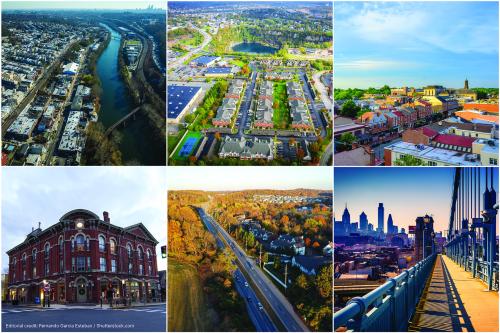Throughout the most recent football season, a recurring NFL ad promoting a partnership with the National Urban League featured a sobering statistic from Brookings Metro’s research: Nationwide, homes in Black-majority neighborhoods are devalued at an average rate of 23%, translating to a $48,000 loss in value per home.
Our report, The devaluation of assets in Black neighborhoods: The case of residential property, examines the real estate market and homeownership in Black neighborhoods to ask the question, What is the cost of racial bias? One answer is a cumulative loss of $156 billion dollars in the value across the nation’s Black-majority neighborhoods. It can be hard to wrap our heads around a number that large, so another way of thinking about home devaluation is examining how it plays out in metropolitan areas.
In this piece, we look at the cost of Black-majority neighborhood home devaluation in the nearest metropolitan area of this year’s NFL playoff teams. We begin with a breakdown of last month’s Super Wild Card Weekend, mirroring the NFL matchups. To calculate the “winners,” we tally up the stats on the percentage of devaluation occurring and how much that translates to in dollar amounts. A negative valuation means that homes in Black neighborhoods are worth less than equivalent homes in comparable neighborhoods that are not Black-majority. A positive valuation means that homes in Black neighborhoods are worth more than equivalent homes in comparable neighborhoods that are not Black-majority.
We didn’t have data for the metro areas of the final two teams (the Arizona Cardinals and Green Bay Packers), so instead we imagine a match-up between the Tennessee Titans and the Los Angeles Rams to complete the Wild Card Weekend.

Round 2: Black home valuation in divisional playoff team metro areas
To simulate the divisional round, the winners of the above matchups face off for the next round of Black-majority home valuation.
 To be clear, this should not be taken as a sign that the Boston metro area has eradicated racism in the housing market, or even that it is necessarily less racist than the other metro areas listed here (a caution that is true for any of the metro areas with positive valuation results). For example, it is possible that a small subset of Black neighborhoods in a metro area could be experiencing faster appreciation rates than the majority, which could skew the results. This is true in the opposite direction too: For metro areas with negative valuation rates, it is possible that this is a hyperlocal effect reflecting a cluster of neighborhoods with sharper rates of depreciation. Given this potential for micro-level variation, it is vital that local policymakers examine the housing dynamics in their own backyard to determine how they stack up against the aggregate numbers at the metro area, state, and national levels.
To be clear, this should not be taken as a sign that the Boston metro area has eradicated racism in the housing market, or even that it is necessarily less racist than the other metro areas listed here (a caution that is true for any of the metro areas with positive valuation results). For example, it is possible that a small subset of Black neighborhoods in a metro area could be experiencing faster appreciation rates than the majority, which could skew the results. This is true in the opposite direction too: For metro areas with negative valuation rates, it is possible that this is a hyperlocal effect reflecting a cluster of neighborhoods with sharper rates of depreciation. Given this potential for micro-level variation, it is vital that local policymakers examine the housing dynamics in their own backyard to determine how they stack up against the aggregate numbers at the metro area, state, and national levels.
Nevertheless, most of the nearest metro areas for these NFL playoff teams are within 10 percentage points of the national valuation rate. This continuity is impressive given that these teams represent several different regions across all corners of the country. Figure 1 shows how each of the divisional playoff teams stack up against the national average of Black homes devaluation.

Ending housing devaluation requires systemic solutions
As noted in their ad, the NFL has partnered with the National Urban League as part of its social justice initiative, Inspire Change. In a press release, the National Urban League wrote, “The NFL’s support allows for the expansion of counseling services to assist homeowners and renters find and maintain affordable, accessible housing.” While this partnership is meaningful in helping empower individuals, our research on housing devaluation reveals that we need structural solutions to complement this crucial aid to individuals. Black people cannot build intergenerational wealth simply by buying a home if that home is not properly valued at the point when they seek to refinance their mortgage, sell it, or use the home’s equity to help pay for their children’s college education. And while this partnership shows the NFL’s public commitment to social justice, the lower values of homes in Black neighborhoods reflect the devaluation of people. The recently filed class-action lawsuit by former Miami Dolphins coach Brian Flores alleging systemic racial discrimination in hiring decisions demonstrates that the NFL has substantial internal work to do to ensure that it is not devaluing people based on race.
To address the systemic causes of widespread devaluation of homes in Black neighborhoods, Ashoka and the Brookings Institution have launched a large-scale effort to foster a new generation of structural innovations to address racism in the housing market. The Valuing Homes in Black Communities Challenge will award up to $1 million in prize funds to innovators who are proximate to the problem of home devaluation and have a market- or policy-based innovation. You can meet the innovators who have submitted their solutions to the challenge here. In the future, as part of this challenge, we will be publishing articles that highlight proposed solutions and best practices. Policymakers across the nation should follow along to learn from the insights that arise.
The Brookings Institution is committed to quality, independence, and impact.
We are supported by a diverse array of funders. In line with our values and policies, each Brookings publication represents the sole views of its author(s).











Commentary
How devalued are homes in NFL teams’ metro areas?
February 10, 2022